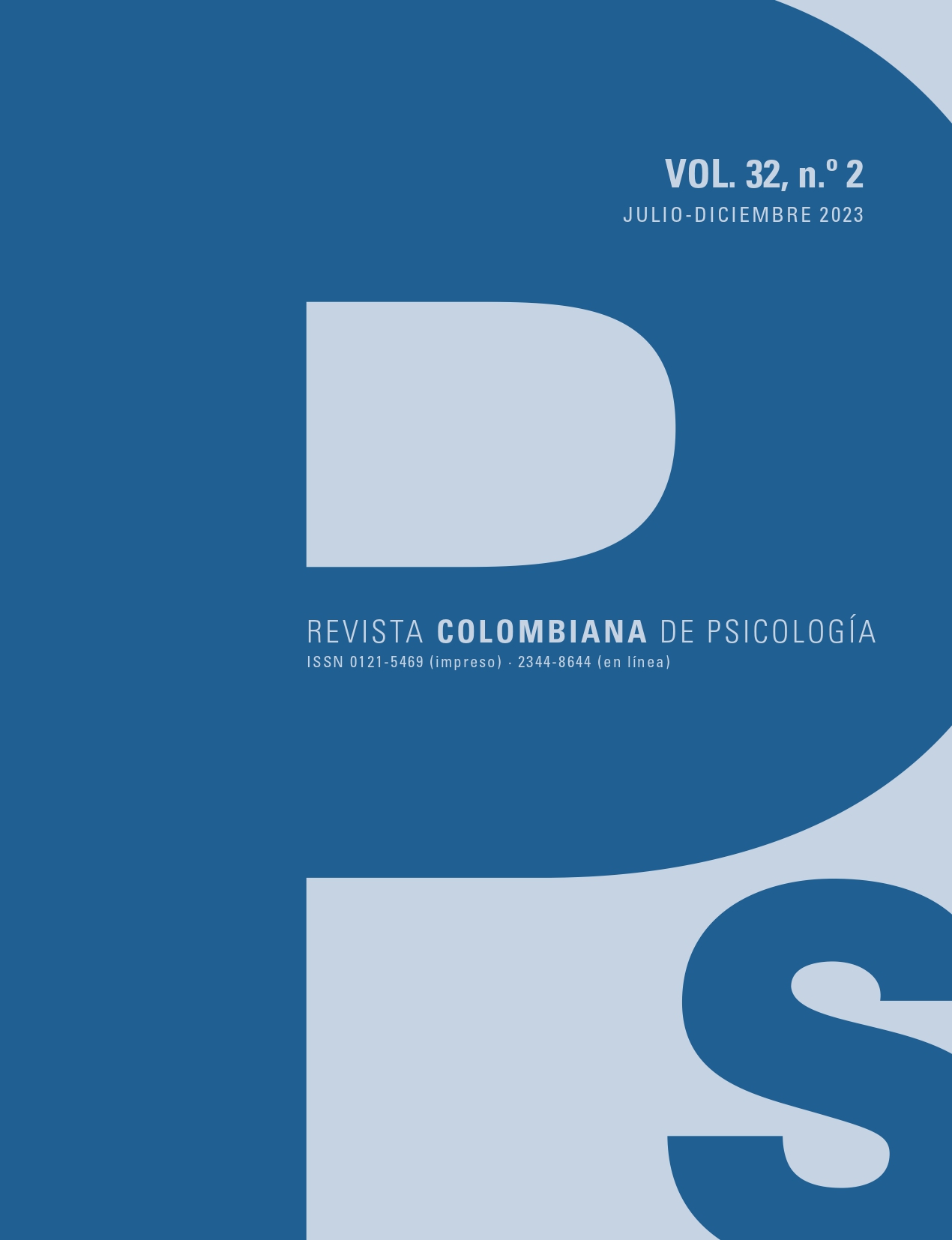Generating Subjective Theories After a Disaster: The Role of Personality
Generación de teorías subjetivas después de un desastre: el papel de la personalidad
Geração de teorias subjetivas após um desastre: o papel da personalidade
DOI:
https://doi.org/10.15446/rcp.v30n2.79061Keywords:
natural disaster, South America, Chile, tsunami, subjective theories, rumination (en)desastre natural, América del Sur, Chile, tsunami, teorías subjetivas, rumiación (es)
desastre natural, América do Sul, Chile, tsunami, teorias subjetivas, ruminação (pt)
Downloads
The role of people's beliefs in their perception of disasters has been scarcely studied. In this study, we analyzed how people who experienced an earthquake and a subsequent tsunami employ subjective theories (ST) to explain their traumatic experience. This study aimed to interpret the explanations developed by a group of people about the earthquake and tsunami that took place in Chile in 2015. Thirteen episodic interviews were conducted as part of a qualitative case study. The participants' theories were grouped into four categories: the impact of personality on one's reaction to hardships; the existence of a link between personality and coping styles; the limited influence of personality on one's way of coping with difficulties; and changes in personality after experiencing hardships. These findings are discussed analyzing whether the participants' explanations could foster personal growth and psychological well-being after the catastrophe.
How to cite this article: González Palta, I., Castro-Carrasco, P., Cabrera, E., Jamet, P., & Leal-Soto, F. (2021). Generating Subjective Theories After a Disaster: The Role of Personality. Revista Colombiana de Psicología, 30(2), 13-26. https://doi.org/10.15446/rcp.v30n2.79061
El rol de las creencias en la experiencia del desastre ha sido poco investigado. En este estudio se analizó cómo personas que experimentaron un terremoto y posterior tsunami, utilizan teorías subjetivas (ST) para explicar la experiencia traumática. El propósito de este estudio fue interpretar las explicaciones que algunas personas elaboraron respecto al terremoto y tsunami vivido en la zona norte de Chile el año 2015. Se realizaron trece entrevistas episódicas, en el marco de un estudio de caso con metodología cualitativa. Como hallazgos interesantes de las teorías surgen cuatro categorías: implicancias de la personalidad en la reacción ante dificultades; existencia de relación entre personalidad y estilo de afrontamiento; poca importancia de la personalidad al momento de afrontar dificultades y cambio en la personalidad luego de experimentar una dificultad. Estos hallazgos se discuten analizando si estas explicaciones podrían favorecer -o no- el crecimiento y bienestar psicológico posterior a la catástrofe.
Cómo citar este artículo: González Palta, I., Castro-Carrasco, P., Cabrera, E., Jamet, P., & Leal-Soto, F. (2021). Generación de teorías subjetivas después de un desastre: el papel de la personalidad. Revista Colombiana de Psicología, 30(2), 13-26. https://doi.org/10.15446/rcp.v30n2.79061
O papel das crenças na experiência do desenhador foi poco investigado. Este estudo tem como objetivo a experiência de um terremoto e posterior tsunami, utilizando as teorias subjetivas (ST) para explicar a experiência traumática. O objetivo deste estudo é interpretar as explicações que as pessoas fazem para a execução do terremoto e do tsunami vivido na zona norte do Chile o ano de 2015. Realizar-se trecho com sessões curtas, no marco de um estudio de caso com a metodologia cualitativa. Como os interesantes de las teorias surgiram com categorias: implicancias da personalidade na reação ante dificultades; existencia de relación entre personalidad y estilo de afrontamiento; poca importancia de la personalidad momento de afrontar dificultades y cambio na personalidad luego de experimentar una dificultad. Estos hallazgos its discuten analizando the estas explicaciones podrían favorecer -o no-the crecimiento y bienestar psicológico posterior a la catástrofe.
References
Allport, G. W. (1961). Pattern and growth in personality. New York: Holt, Rinehart, & Winston.
Armaş, L., Zeno, R., & Ionescu, R. (2017). Self-efficacy, stress, and locus of control: The psychology of earthquake risk perception in Bucharest, Romania. International Journal of Disaster Risk Reduction, 22, 71-76. https://doi.org/10.1016/j.ijdrr.2017.02.018
Arnoso, M., Bilbao, M., & Páez, D. (2011). Violencia colectiva y creencias básicas sobre el mundo, los otros y el yo. Impacto y reconstrucción. In Páez, D., Beristain, C., González, J.L., Basabe, N. & de Rivera, J. (Eds.), Superando la violencia colectiva y construyendo cultura de paz (pp. 247–277). Madrid: Editorial Fundamentos.
Baker, J. M., Kelly, C., Calhoun, L. G., Cann, A., & Tedeschi, R. G. (2008). An examination of posttraumatic growth and posttraumatic depreciation: Two exploratory studies. Journal of Loss and Trauma, 13, 450-465. https://doi.org/10.1080/15325020802171367
Bandura, A. (1999). Social cognitive theory of personality. In L. A. Pervin & O. P. John (Eds.), Handbook of personality: Theory and research (pp. 154-196). New York, NY, US: Guilford Press.
Calhoun, L. G., & Tedeschi, R. G. (2006). The foundations of posttraumatic growth: An expanded framework. In L. G. Calhoun & R. G. Tedeschi (Eds.), Handbook of posttraumatic growth: Research and practice (pp. 3-23). New Jersey: Erlbaum.
Calhoun, L. G., Tedeschi, R. G., Cann, A., & Hanks, E. A. (2010). Positive outcomes following bereavement: Paths to posttraumatic growth. Psychologica Belgica, 50, 125-143. https://doi.org/10.5334/pb-50-1-2-125
Cann, A., Calhoun, L. G., Tedeschi, R. G., Triplett, K. N., Vishnevsky, T., & Lindstrom, C. M. (2011). Assessing posttraumatic cognitive processes: The event related rumination inventory. Anxiety, Stress, & Coping, 24, 137-156. https://doi.org/10.1080/10615806.2010.529901
Carlos, M. L., & Sellers, L. (1972). Family, kinship structure, and modernization in Latin America. Latin American Research Review, 7, 95-124.
Castro, P. J., Krause, M., & Frisancho, S. (2015). Teoría del cambio subjetivo: aportes desde un estudio cualitativo con profesores. Revista Colombiana de Psicología, 24, 363-379. https://doi.org/10.15446/rcp.v24n2.44453
Catalán, J. (2010). Teorías subjetivas aspectos teóricos y prácticos. La Serena: ULS Editorial.
Catalán, J. (2016). Hacia la formulación de una teoría general de las teorías subjetivas. Psicoperspectivas, 15, 53-65. https://doi.org/10.5027/psicoperspectivas-Vol15-Issue1-fulltext-739
Chan, C., Rhodes, J., Pérez, J. (2012). A prospective study of religiousness and psychological distress among female survivors of Hurricanes Katrina and Rita. American Journal of Community Psychology, 49 (1-2), 168-181. https://doi.org/10.1007/s10464-011-9445-y
Corbin, J., & Strauss, A. (2008). Basics of qualitative research (3rd ed.): Techniques and procedures for developing grounded theory. California: Sage Publications, Inc. https://doi.org/10.4135/9781452230153
Cuadra, D., Castro, P. J., Vystrčilová, P., & Jancic Mogliacci, R. J. (2017). A review of research on teachers’ subjective theories: contributions to the study of teacher education. Psychology and Education an Interdisciplinary
Journal, 54, 1-22.
Daly, P. (2014). Embedded wisdom or rooted problems? Aid workers’ perspectives on local social and political infrastructure in post-tsunami Aceh. Disasters, 39, 232-257. https://doi.org/10.1111/disa.12105
Dann, H. (1983). Subjektive Theorien: Irrweg oder Forschungsprogramm Zwischenbilanz eines kognitiven
Konstrukts. In Montada, L., Reusser, K., & G. Steiner (Eds.), Kognition und Handeln (pp. 77-92). Stuttgart: Klett.
Díaz, C. A., Quintana, G. R., & Vogel, E. H. (2012). Depression, anxiety and post-traumatic stress disorder symptoms in adolescents seven months after the February 27 2010 earthquake in Chile. Terapia psicológica, 30, 37-43. https://doi.org/10.4067/S0718-48082012000100004
Drury, J., Brown, R., González, R., & Miranda, D. (2015). Emergent social identity and observing social support predict social support provided by survivors in a disaster: Solidarity in the 2010 Chile earthquake. European Journal of Social Psychology, 46, 209-223. https://doi.org/10.1002/ejsp.2146
Ehlers, A., & Clarke, D. M. (2000). A cognitive model of posttraumatic stress disorder. Behavior Research and Therapy, 38, 319-345. https://doi.org/10.1016/S0005-7967(99)00123-0
Flick, U. (2014). An introduction to qualitative research. London: Sage.
García, F. E. (2011). Prevention of psychopathological consequences in survivor of tsunamis. In Mokhtari, M. (ed.) Tsunami: A growing disaster (pp. 211-232). Rijeka: InTech. https://doi.org/10.5772/922
García, F. E., Cova, F., Rincón, P., & Vázquez, C. (2015). Trauma or growth after a natural disaster? The mediating role of rumination processes. European Journal of Psychotraumatology, 6, 1-10. https://doi.org/10.3402/ejpt.v6.26557
García, F. E., Jaramillo, C., Martínez, A. M., Valenzuela, I., & Cova, F. (2014). Respuestas psicológicas ante un desastre natural: Estrés y crecimiento postraumático. Liberabit, 20, 121-130.
Goenjian, A. K., Molina, L., Steinberg, A. M., Fairbanks L. A., Alvarez, M. L., Goenjian H. A., & Pynoos R. S. (2001). Posttraumatic stress and depressive reactions among Nicaraguan adolescents after hurricane Mitch. American Journal of Psychiatry, 158, 788-94. https://doi.org/10.1176/appi.ajp.158.5.788
González-Muzzio, C. (2013). El rol del lugar y el capital social en la resiliencia comunitaria posdesastre: aproximaciones mediante un estudio de caso después del terremoto del 27/F. EURE, 39, 25-48. https://doi.org/10.4067/S0250-71612013000200002
Groeben, N., & Scheele, B. (2000). Dialogue-hermeneutic method and the “research program subjective
theories”. Forum Qualitative Sozialforschung, 2. https://doi.org/10.17169/fqs-1.2.1079
Hu, X., Cao, X., Wang, H., Chen, Q., Liu, M., & Yamamoto, A. (2016). Probable post-traumatic stress disorder and its predictors in disaster-bereaved survivors: a longitudinal study after the Sichuan earthquake. Archives of Psychiatric Nursing, 30, 192-197. https://doi.org/10.1016/j.apnu.2015.08.011
Jancic, R. (2011). Teachers’ capability related subjective theories [Poster]. Exhibited at the Human Development and Capability Association Conference (hdca). Hague, Netherlands.
Janoff-Bulman, R. (1992). Shattered Assumptions: Towards a New Psychology of Trauma. New York: Free Press.
Krause, M. (2011). Psicoterapia y cambio. Una mirada desde la subjetividad. Santiago de Chile: Ediciones Universidad Católica de Chile, 2nd edition.
Kvale, S. (2007). Doing interviews. Sage Publications. The Sage Qualitative Research Kit, Vol. 2
Lazarus, R. S., & Folkman, S. (1984). Stress, appraisal, and coping. New York: Springer. https://doi.org/10.1007/978-1-4419-1005-9_215
Leal-Soto, F., Carmona-Halty, M., & Ferrer-Urbina, R. (2016). Rumination in posttraumatic stress and growth after a natural disaster: a model from northern Chile 2014 earthquakes. European Journal of Psychotraumatology, 7, 1-11. https://doi.org/10.3402/ejpt.v7.31638
Leiva-Bianchi, M., Baher, G., & Poblete, C. (2012). The effects of stress coping strategies in post-traumatic stress symptoms among earthquake survivors: an explanatory model of post-traumatic stress. Terapia Psicológica, 30, 51-59. https://doi.org/10.4067/S0718-48082012000200005
Lincoln. Y. S., & Guba, E. G. (1985). Naturalistic inquiry. New York: Sage Publications.
Marková, P. (2013). Analysis of teachers’ subjective theories about biophiled orientation of education. Procedia-Social and Behavioral Sciences, 93, 820-824. https://doi.org/10.1016/j.sbspro.2013.09.286
McCrae, R. R., & Costa, P. T. (1996). Toward a new generation of personality theories: Theoretical contexts for the five-factor model. In J. S. Wiggins (Ed.), The five-factor model of personality: Theoretical perspectives (pp. 51-87). New York: Guilford.
McGeehan, K. M., & Baker, C. K. (2017). Religious narratives and their implications for disaster risk reduction. Disasters, 41, 258-281. https://doi.org/10.1111/disa.12200
O’Connell, E., Abbott, R. P., & White, R. S. (2017). Emotions and beliefs after a disaster: A comparative analysis of Haiti and Indonesia. Disasters, 41, 803-827. https://doi.org/10.1111/disa.12227
Oliver-Smith, A. (1996). Anthropological research on hazards and disasters. Annual Review Anthropology, 25, 303-328. https://doi.org/10.1146/annurev.anthro.25.1.303
Onetto, M. (2014). Terremotos recordados, temblores olvidados: Interpretaciones sobre los orígenes de la memoria telúrica en Chile. Revista de geografía Norte Grande,59, 185-199. https://doi.org/10.4067/S0718-34022014000300011
Onemi. (2015). Monitoreo por sismo de mayor intensidad. Retrieved from http://www.onemi.cl/alerta/se-declara-alerta-roja-por-sismo-de-mayor-intensidad-y-alarma-de-tsunami/
Park, C. L. (2016). Meaning making in the context of disasters. Journal of Clinical Psychology, 72, 1234-1246. https://doi.org/10.1002/jclp.22270
Universidad de Chile’s National Seismological Center [Centro sismológico nacional de la Universidad de Chile]. (2015). Sismos por día, Chile. Retrieved from http://www.sismologia.cl/
Valenzuela, J. (2012). Relaciones jesuitas del terremoto de 1730: Santiago, Valparaíso y Concepción. Cuadernos de Historia, 37, 185-224. https://doi.org/10.4067/S0719-12432012000200007
Yang, J., Yang, Y., Liu, X., Tian, J., Zhu, X., & Miao, D. (2010). Self-efficacy, social support, and coping strategies of adolescent earthquake survivors China. Social behavior and personality: an international journal, 38, 1219-1228. https://doi.org/10.2224/sbp.2010.38.9.1219
Yeager, D. S. (2017). Dealing with social difficulty during adolescence: The role of implicit theories of personality. Child Development Perspectives, 11, 196-201. https://doi.org/10.1111/cdep.12234
Zhen, R., Quan, L., Yao, B., & Zhou, X. (2016). Understanding the relationship between rainstorm-related
experiences and ptsd among Chinese adolescents after rainstorm disaster: the roles of rumination and social support. Frontiers in Psychology, 7, 1-8. https://doi.org/10.3389/fpsyg.2016.01407
How to Cite
APA
ACM
ACS
ABNT
Chicago
Harvard
IEEE
MLA
Turabian
Vancouver
Download Citation
CrossRef Cited-by
1. Juan David Hernandez-Posada, Javier Corredor, Alejandra María Martínez-Salgado. (2023). Crime and Punishment: How Historical Narratives Affect the Evaluation of Restorative and Retributive Justice. Journal of Human Values, 29(3), p.261. https://doi.org/10.1177/09716858231154381.
Dimensions
PlumX
Article abstract page views
Downloads
License
Copyright (c) 2021 Revista Colombiana de PsicologíaThe RCP is published under the Creative Commons license and can be copied and reproduced according to the conditions of this license (http://creativecommons.org/licenses/by-nc-nd/2.5). RCP articles are available online at https://revistas.unal.edu.co/index.php/psicologia/issue/archive. If you would like to subscribe to the RCP as reader, please go to https://revistas.unal.edu.co/index.php/psicologia/information/readers and follow the instructions mentioned in the webpage. Additionally, a limited number of print journals are available upon request. To request print copies, please email revpsico_fchbog@unal.edu.co.


























